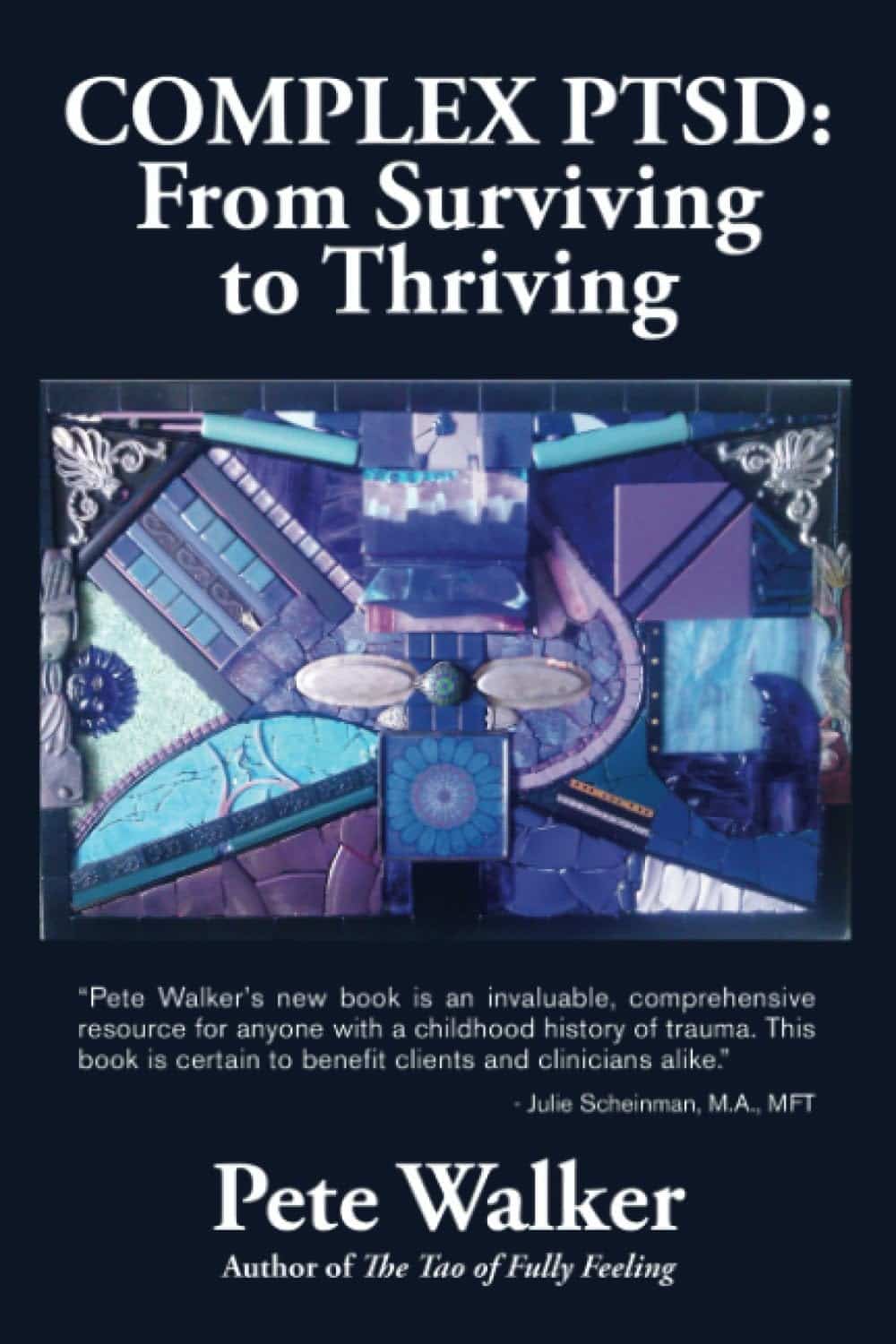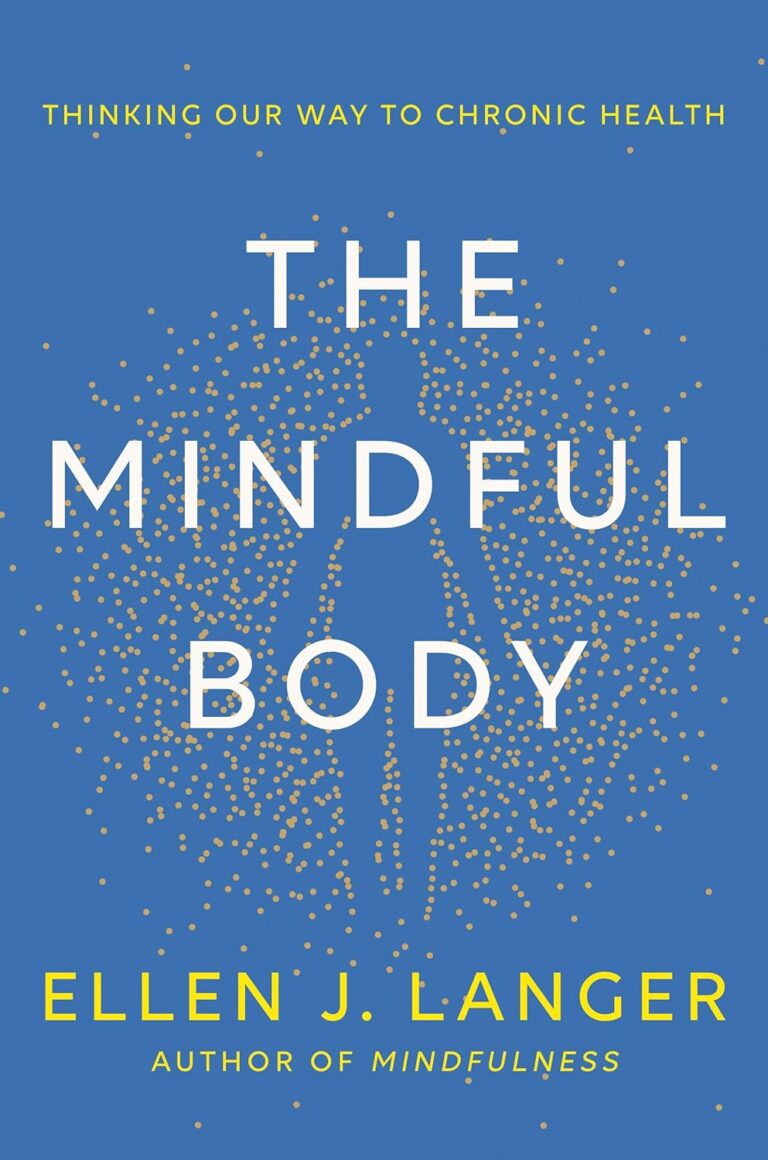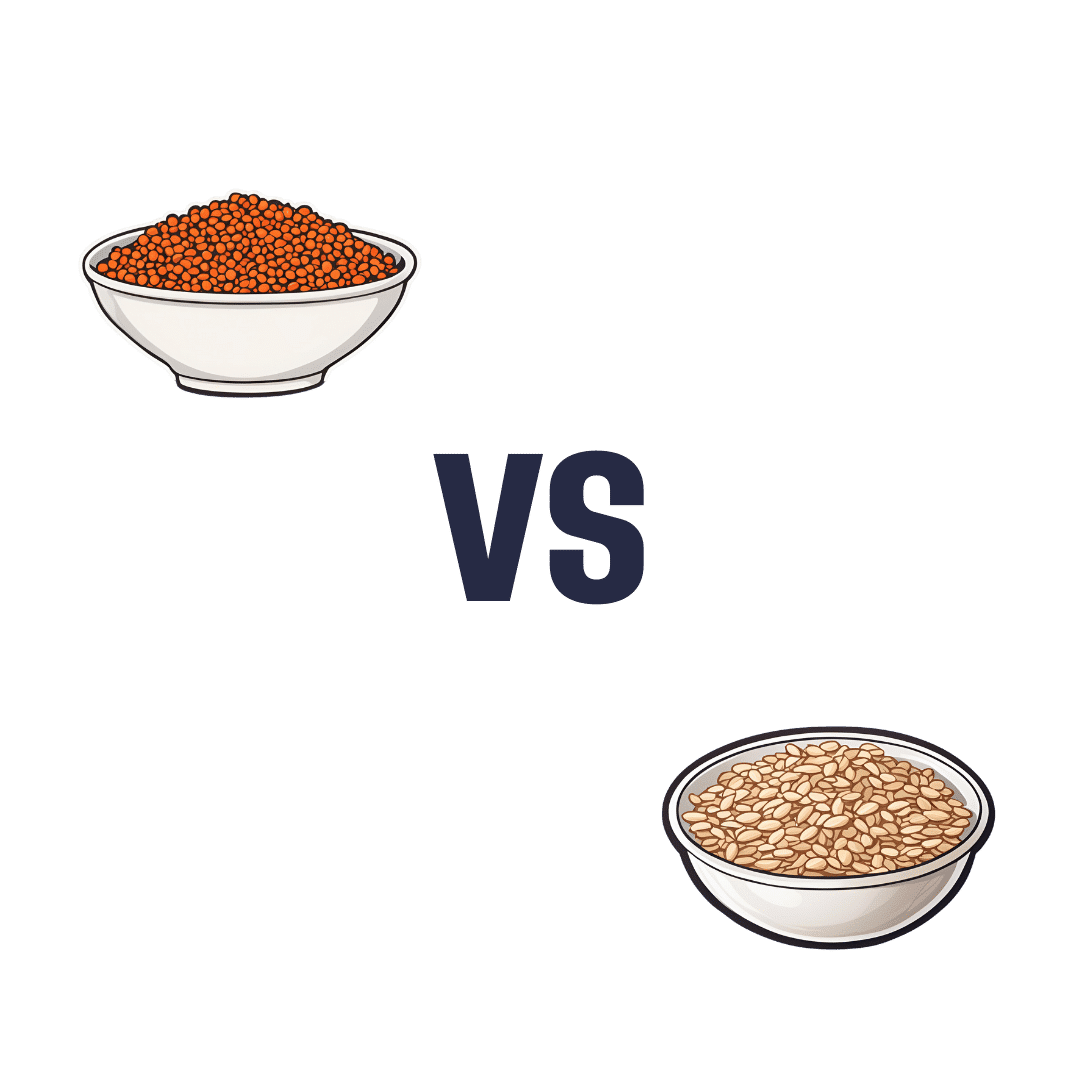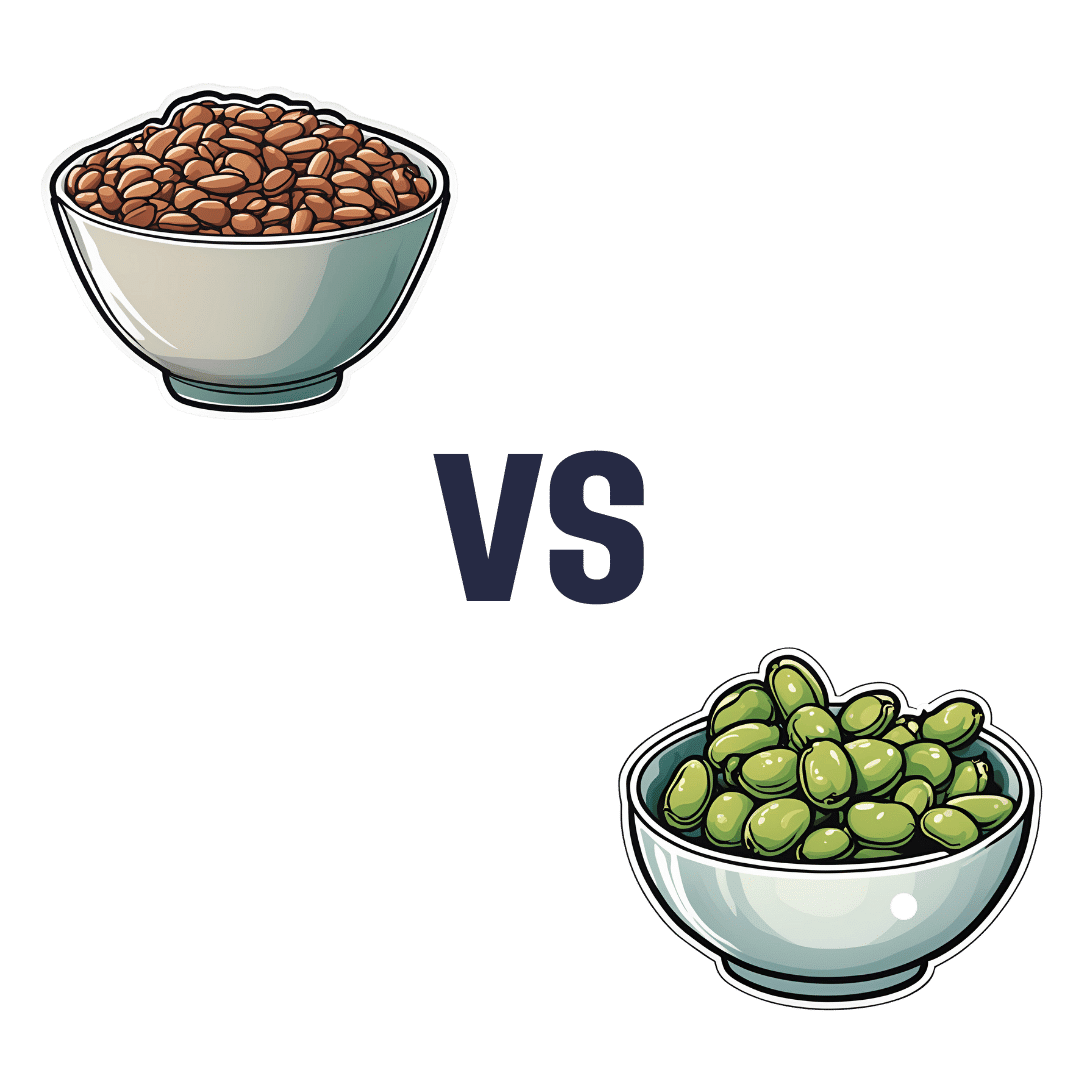
Complex PTSD – by Pete Walker
10almonds is reader-supported. We may, at no cost to you, receive a portion of sales if you purchase a product through a link in this article.
We’ve written before about Complex PTSD, but there’s a lot more to be said than we can fit into an article or two.
Pete Walker, a licensed marriage and family therapist, does an excellent job and pulls no punches, starting from the book’s dedication and carrying the hard-hitting seriousness all the way through to the Appendices.
To this end, it absolutely may not be an easy book to read at times (emotionally speaking), especially if you have C-PTSD. On the other hand, you may also find it a very validating 300-odd pages of “Yes, he is telling my life story in words, now this makes sense!”
That said, it’s mostly not an anecdotes-based book and nor is it just a feelsy ride; it’s also a textbook and a how-to manual. It’s a textbook of how and why things come about the way they do, and a manual of how to effectively manage C-PTSD, and find peace. There’s no silver bullet here, but there is a very comprehensive guide, and chapters full of tools to use (and no, not the same CBT things you’ve probably read a hundred times, this is C-PTSD-specific stuff).
Bottom line: this is the C-PTSD book; if you buy only one book on the topic, make it this one.
Click here to check out Complex PTSD: From Surviving To Thriving, and indeed thrive!
Don’t Forget…
Did you arrive here from our newsletter? Don’t forget to return to the email to continue learning!
Recommended
Learn to Age Gracefully
Join the 98k+ American women taking control of their health & aging with our 100% free (and fun!) daily emails:
-
The Brain Fog Fix – by Dr. Mike Dow
10almonds is reader-supported. We may, at no cost to you, receive a portion of sales if you purchase a product through a link in this article.
The three weeks mentioned in the subtitle is in fact a week-by-week plan:
- Adjusting diet (inclusions and exclusions) and cognitive strategies
- Focusing on sleep, exercise, and memory-boosting “brain games”
- Bringing in the social aspect, and connection to something larger than oneself
In this reviewer’s opinion, a week is too short a time to completely overhaul one’s diet; most changes need to be gradual, so doing several at once in a week is quite extreme. But, even if it takes a month for each stage instead of a week, the method is reasonable.
The nutritional advice is good, and consistent with current best science on the topic. There’s a lot about keeping even blood sugars and improving insulin sensitivity, as well as doing what is best for the heart and blood in general (e.g. fiber, managing triglycerides, doing the right kinds of exercise, etc).
As a psychotherapist, he also talks a fair bit about neurotransmitters, and making sure one’s gut and brain are fed appropriately to keep the correct balance (remembering for example that serotonin is made in the gut, and dopamine is made in the brain). Unlike many of his colleagues, he’s not a fan of medicating beyond absolute necessity.
The style is a little salesy for this reviewer’s personal taste—but then again, perhaps he made the reasonable assumption that a person reading a book entitled “the brain fog fix” needs their attention grabbing and re-grabbing every paragraph or so. As such, maybe it’s not a bad call.
Bottom line: if you have brain fog and would like to not have brain fog, this book offers a scientifically sound, evidence-based, holistic approach that can certainly improve things.
Click here to check out The Brain Fog Fix, and fix your brain fog!
Share This Post
-
Red Lentils vs Oats – Which is Healthier?
10almonds is reader-supported. We may, at no cost to you, receive a portion of sales if you purchase a product through a link in this article.
Our Verdict
When comparing red lentils to oats, we picked the oats.
Why?
In terms of macros, oats have more protein, carbs, fiber, and even a little fat—mostly healthy mono- and polyunsaturated fats, thus making them the more nutritionally dense. That said, red lentils have the lower glycemic index, (low GI compared to oats’ medium GI) which offsets that, so we’ll call this category a tie.
In the category of vitamins, red lentils have more of vitamins B6, B9, and choline, while oats have more of vitamins B1, B2, and B5. Another tie!
When it comes to minerals, however, we have a tiebreaker category: red lentils have more selenium, while oats have more calcium, copper, iron, magnesium, manganese, phosphorus, potassium, and zinc. An easy win for oats this time!
So, thanks to the minerals, oats are the clear winner in total. But by all means, enjoy either or both; diversity is good!
Want to learn more?
You might like to read:
The Best Kind Of Fiber For Overall Health? ← it’s β-glucan, the kind find in oats!
Enjoy!
Share This Post
-
Pinto Beans vs Fava Beans – Which is Healthier?
10almonds is reader-supported. We may, at no cost to you, receive a portion of sales if you purchase a product through a link in this article.
Our Verdict
When comparing pinto beans to fava beans, we picked the pinto beans.
Why?
It wasn’t close!
In terms of macros, pinto beans have more protein and carbs, and much more fiber, resulting in a much lower glycemic index. We mention this, because while often the GI of two similar foods is similar, in this case pinto beans have a GI of 39 (low), while fava beans have a GI of 79 (high). In other words, not at all close, and pinto beans are the clear winner.
When it comes to vitamins, pinto beans have more of vitamins B1, B5, B6, B7, B9, C, E, K, and choline, while fava beans have more of vitamins B2 and B3. Once again, not close, and that’s before we take into account the margins of difference for those vitamins; the margins of difference are much greater on the pinto beans’ side of the scale, for example pinto beans having 47x more vitamin E, while fava beans have only 43% more vitamin B2. So, orders of magnitude less. A clear win for pinto beans in all respects.
In the category of minerals, pinto beans have more calcium, iron, magnesium, manganese, phosphorus, potassium, and selenium, while fava beans have more copper and zinc. This time, the margins of difference were quite moderate across the board, and/but pinto beans win on clear strength of numbers.
All in all, three clear wins for pinto beans add up to one big clear win for pinto beans.
Enjoy!
Want to learn more?
You might like to read:
What Matters Most For Your Heart? Eat More (Of This) For Lower Blood Pressure
Take care!
Share This Post
Related Posts
-
Unleashing Your Best Skin – by Jennifer Sun
10almonds is reader-supported. We may, at no cost to you, receive a portion of sales if you purchase a product through a link in this article.
The author, an aesthetician with a biotech background, explains about the overlap of skin health and skin beauty, making it better from the inside first (diet and other lifestyle factors), and then tweaking things as desired from the outside.
In the broad category of “tweakments” as she puts it, she covers most of the wide array of modern treatments available at many skin care clinics and the options for which at-home do-it-yourself kits are available—and the pros and cons of various approaches.
And yes, those methods do range from microneedling and red light therapy to dermal fillers and thread lifts. Most of them are relatively non-invasive though.
She also covers common ailments of the skin, and how to identify and treat those quickly and easily, without making things worse along the way.
One last thing she also includes is dealing with unwanted hairs—being a very common side-along issue when it comes to aesthetic medicine.
The book is broadly aimed at women, but hormones are not a main component discussed (except in the context of acne), so there’s no pressing reason why this book couldn’t benefit men too. It also addresses considerations when it comes to darker skintones, something that a lot of similar books overlook.
Bottom line: if you find yourself mystified by the world of skin treatment options and wondering what’s really best for you without the bias of someone who’s trying to sell you a particular treatment, then this is the book for you.
Click here to check out Unleashing Your Best Skin, and unleash your best skin!
Don’t Forget…
Did you arrive here from our newsletter? Don’t forget to return to the email to continue learning!
Learn to Age Gracefully
Join the 98k+ American women taking control of their health & aging with our 100% free (and fun!) daily emails:
-
Licorice, Digestion, & Hormones
10almonds is reader-supported. We may, at no cost to you, receive a portion of sales if you purchase a product through a link in this article.
Let’s Take A Look At Licorice…
Licorice, as a confectionary, is mostly sugar and is useless for medicinal purposes.
Licorice (Glycyrrhiza sp., most often Glycyrrhiza glabra), in the form of either the root extract (which can be taken as a supplement, or used topically) or the whole root (which can be taken as a powder/capsule, or used to make tea), is a medicinal plant with a long history of use.
How well-evidenced is it for its popular uses?
Licorice for digestion
In this case, it is more accurate to say that it combats indigestion, including acid reflux and ulcerative colitis:
Systematic Review on Herbal Preparations for Controlling Visceral Hypersensitivity in Functional Gastrointestinal Disorders ← licorice was a top-tier performer in this review
Network pharmacology mechanisms and experimental verification of licorice in the treatment of ulcerative colitis ← looking at the mechanism of action; ultimately they concluded that “licorice improves ulcerative colitis, which may be related to the activation of the Nrf2/PINK1 signaling pathway that regulates autophagy.“
Licorice vs menopause symptoms
This one, while a popular use, isn’t so clear. Here’s a study that examines the compounds in licorice (in this case, Glycyrrhiza uralensis) that interact with estrogen receptors, notes that the bioavailability is poor, and proposes, tests, and recommends a way to make it more bioavailable:
On the other hand, it is established that it will lower serum testosterone levels, which may make it beneficial for menopause and/or PCOS:
Polycystic ovaries and herbal remedies: A systematic review
Licorice for men
You may be wondering: what about for men? Well, the jury is out on whether it meaningfully reduces free testosterone levels:
Licorice consumption and serum testosterone in healthy men
See also:
And finally, it may (notwithstanding its disputed effect on testosterone itself) be useful as a safer alternative to finasteride (an antiandrogen mostly commonly used to treat benign prostatic hyperplasia, also used to as a hair loss remedy), since it (like finasteride) modulates 5α-reductase activity (this enzyme converts testosterone to the more potent dihydrogen testosterone, DHT), without lowering sperm count:
Licorice for the skin
As well as its potentially estrogenic activity, its anti-inflammatory and antioxidant powers make it comparable to hydrocortisone cream for treating eczema, psoriasis, and other such skin conditions:
New Herbal Biomedicines for the Topical Treatment of Dermatological Disorders
Is it safe?
It is “generally recognized as safe”, as the classification goes.
However, consumed in excess it can cause/worsen hypertension, and other contraindications include if you’re on blood thinners, or have kidney problems.
As ever, this is a non-exhaustive list, so do speak with your doctor/pharmacist to be sure.
Want to try some?
We don’t sell it, but here for your convenience is an example product on Amazon
Enjoy!
Don’t Forget…
Did you arrive here from our newsletter? Don’t forget to return to the email to continue learning!
Learn to Age Gracefully
Join the 98k+ American women taking control of their health & aging with our 100% free (and fun!) daily emails:
-
Without Medicare Part B’s Shield, Patient’s Family Owes $81,000 for a Single Air-Ambulance Flight
10almonds is reader-supported. We may, at no cost to you, receive a portion of sales if you purchase a product through a link in this article.
Without Medicare Part B’s Shield, Patient’s Family Owes $81,000 for a Single Air-Ambulance Flight
Debra Prichard was a retired factory worker who was careful with her money, including what she spent on medical care, said her daughter, Alicia Wieberg. “She was the kind of person who didn’t go to the doctor for anything.”
That ended last year, when the rural Tennessee resident suffered a devastating stroke and several aneurysms. She twice was rushed from her local hospital to Vanderbilt University Medical Center in Nashville, 79 miles away, where she was treated by brain specialists. She died Oct. 31 at age 70.
One of Prichard’s trips to the Nashville hospital was via helicopter ambulance. Wieberg said she had heard such flights could be pricey, but she didn’t realize how extraordinary the charge would be — or how her mother’s skimping on Medicare coverage could leave the family on the hook.
Then the bill came.
The Patient: Debra Prichard, who had Medicare Part A insurance before she died.
Medical Service: An air-ambulance flight to Vanderbilt University Medical Center.
Service Provider: Med-Trans Corp., a medical transportation service that is part of Global Medical Response, an industry giant backed by private equity investors. The larger company operates in all 50 states and says it has a total of 498 helicopters and airplanes.
Total Bill: $81,739.40, none of which was covered by insurance.
What Gives: Sky-high bills from air-ambulance providers have sparked complaints and federal action in recent years.
For patients with private insurance coverage, the No Surprises Act, which went into effect in 2022, bars air-ambulance companies from billing people more than they would pay if the service were considered “in-network” with their health insurers. For patients with public coverage, such as Medicare or Medicaid, the government sets payment rates at much lower levels than the companies charge.
But Prichard had opted out of the portion of Medicare that covers ambulance services.
That meant when the bill arrived less than two weeks after her death, her estate was expected to pay the full air-ambulance fee of nearly $82,000. The main assets are 12 acres of land and her home in Decherd, Tennessee, where she lived for 48 years and raised two children. The bill for a single helicopter ride could eat up roughly a third of the estate’s value, said Wieberg, who is executor.
The family’s predicament stems from the complicated nature of Medicare coverage.
Prichard was enrolled only in Medicare Part A, which is free to most Americans 65 or older. That section of the federal insurance program covers inpatient care, and it paid most of her hospital bills, her daughter said.
But Prichard declined other Medicare coverage, including Part B, which handles such things as doctor visits, outpatient treatment, and ambulance rides. Her daughter suspects she skipped that coverage to avoid the premiums most recipients pay, which currently are about $175 a month.
Loren Adler, a health economist for the Brookings Institution who studies ambulance bills, estimated the maximum charge that Medicare would have allowed for Prichard’s flight would have been less than $10,000 if she’d signed up for Part B. The patient’s share of that would have been less than $2,000. Her estate might have owed nothing if she’d also purchased supplemental “Medigap” coverage, as many Medicare members do to cover things like coinsurance, he said.
Nicole Michel, a spokesperson for Global Medical Response, the ambulance provider, agreed with Adler’s estimate that Medicare would have limited the charge for the flight to less than $10,000. But she said the federal program’s payment rates don’t cover the cost of providing air-ambulance services.
“Our patient advocacy team is actively engaged with Ms. Wieberg’s attorney to determine if there was any other applicable medical coverage on the date of service that we could bill to,” Michel wrote in an email to KFF Health News. “If not, we are fully committed to working with Ms. Wieberg, as we do with all our patients, to find an equitable solution.”
The Resolution: In mid-February, Wieberg said the company had not offered to reduce the bill.
Wieberg said she and the attorney handling her mother’s estate both contacted the company, seeking a reduction in the bill. She said she also contacted Medicare officials, filled out a form on the No Surprises Act website, and filed a complaint with Tennessee regulators who oversee ambulance services. She said she was notified Feb. 12 that the company filed a legal claim against the estate for the entire amount.
Wieberg said other health care providers, including ground ambulance services and the Vanderbilt hospital, wound up waiving several thousand dollars in unpaid fees for services they provided to Prichard that are normally covered by Medicare Part B.
But as it stands, Prichard’s estate owes about $81,740 to the air-ambulance company.
More from Bill of the Month
- The Colonoscopies Were Free. But the ‘Surgical Trays’ Came With $600 Price Tags. Jan 25, 2024
- When a Quick Telehealth Visit Yields Multiple Surprises Beyond a Big Bill Dec 19, 2023
- Out for Blood? For Routine Lab Work, the Hospital Billed Her $2,400 Nov 21, 2023
The Takeaway: People who are eligible for Medicare are encouraged to sign up for Part B, unless they have private health insurance through an employer or spouse.
“If someone with Medicare finds that they are having difficulty paying the Medicare Part B premiums, there are resources available to help compare Medicare coverage choices and learn about options to help pay for Medicare costs,” Meena Seshamani, director of the federal Center for Medicare, said in an email to KFF Health News.
She noted that every state offers free counseling to help people navigate Medicare.
In Tennessee, that counseling is offered by the State Health Insurance Assistance Program. Its director, Lori Galbreath, told KFF Health News she wishes more seniors would discuss their health coverage options with trained counselors like hers.
“Every Medicare recipient’s experience is different,” she said. “We can look at their different situations and give them an unbiased view of what their next best steps could be.”
Counselors advise that many people with modest incomes enroll in a Medicare Savings Program, which can cover their Part B premiums. In 2023, Tennessee residents could qualify for such assistance if they made less than $1,660 monthly as a single person or $2,239 as a married couple. Many people also could obtain help with other out-of-pocket expenses, such as copays for medical services.
Wieberg, who lives in Missouri, has been preparing the family home for sale.
She said the struggle over her mother’s air-ambulance bill makes her wonder why Medicare is split into pieces, with free coverage for inpatient care under Part A, but premiums for coverage of other crucial services under Part B.
“Anybody past the age of 70 is likely going to need both,” she said. “And so why make it a decision of what you can afford or not afford, or what you think you’re going to use or not use?”
Bill of the Month is a crowdsourced investigation by KFF Health News and NPR that dissects and explains medical bills. Do you have an interesting medical bill you want to share with us? Tell us about it!
KFF Health News is a national newsroom that produces in-depth journalism about health issues and is one of the core operating programs at KFF—an independent source of health policy research, polling, and journalism. Learn more about KFF.
Subscribe to KFF Health News’ free Morning Briefing.
Don’t Forget…
Did you arrive here from our newsletter? Don’t forget to return to the email to continue learning!
Learn to Age Gracefully
Join the 98k+ American women taking control of their health & aging with our 100% free (and fun!) daily emails:







